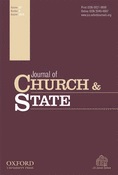Artikel over Spinoza in tijdschrift over Kerk én Staat
In Frankrijk met de grote nadruk op scheiding tussen kerk en
staat, de beroemde of beruchte laïcité, zul je zo’n tijdschrift niet
 aantreffen. Maar bij de Oxford University Press wordt de Journal of Church and State uitgegeven.
Het introduceert zich aldus: “The Journal of Church and State is concerned with
what has been called the "greatest subject in the history of the
West." It seeks to stimulate interest, dialogue, research, and publication
in the broad area of religion and the state.” [cf.]
aantreffen. Maar bij de Oxford University Press wordt de Journal of Church and State uitgegeven.
Het introduceert zich aldus: “The Journal of Church and State is concerned with
what has been called the "greatest subject in the history of the
West." It seeks to stimulate interest, dialogue, research, and publication
in the broad area of religion and the state.” [cf.]
Het blad kent inmiddels al 57 jaargangen. Eén keer in al die jaren had het een artikel over Spinoza’s filosofie inzake de verhouding van kerk en staat. Een zeer interessant artikel in de 54e jaargang (2011) van
Andy Alexis-Baker, "Spinoza's Political Theology: Theocracy, Democracy and Monism." In: Journal of Church and State vol. 54 (2011) no. 3, pages 426–444
Het is vrijgegeven [cf.] en ook als PDF te downloaden. Ik neem hier graag het slot over:
Conclusion
Spinoza wrote during a time when the Dutch Republic was going through a
transition, which meant that violent upheaval had been threatening the
democratic union. Many Dutch politicians, philosophers, and theologians had
argued for democracy before and after Spinoza. This was not unique to him. What
makes Spinoza so interesting is that he argued for democracy not by pitting it
against religion but by making religion necessary for democracy. What
restrained the freedom to philosophize—the main question Spinoza's book sought
to root out and answer—was not that philosophy had been subjected to theology
but, rather that theology had become saddled with prejudices. Thus Spinoza
sought to root them out. One of the most surprising prejudices that Spinoza
argued against is that theocracy is opposed to democracy. Spinoza attempted to
give a theological foundation to democracy that would undercut both monarchists
and Calvinists, both of whom sought to undermine the unity of politics and
theology, which would place the Dutch Republic in the same position as the
ancient Hebrews. In whatever way one evaluates Spinoza's project, whether it
seems as successful as he hoped and whether Christian theology might have
something to learn from it, we cannot characterize him as hostile to religion
per se. Thus Israel, for example, who has pushed back against recent attempts
to understand the Enlightenment as a process of interplay between a variety of
cultural, social, political, religious, and philosophical forces rather than as
a secularization process, seems not only wrong to reject those recent efforts
by insisting that true Enlightenment is “radical” Spinozan Enlightenment but
also perhaps even distorts Spinoza by reading a secularization process onto a
thinker who saw the unity or monism of all things. Spinoza's toleration, which
resulted from his monism, had limits that are troubling for any radical
pacifist, against whose position Spinoza's tolerance comes to an end as a
result of his political theology.

